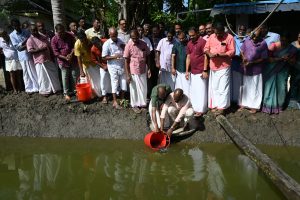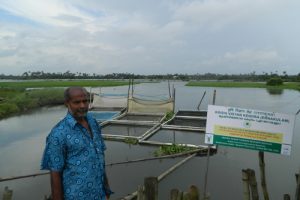Effect of salinity stress on biochemical constituents and ArHsp22 gene expression in Artemia franciscana
Vikas, P A and Thomas, P C and Sajesh Kumar, N K and Chakraborty, Kajal and Sanil, N K and Vijayan, K K (2016) Effect of salinity stress on biochemical constituents and ArHsp22 gene expression in Artemia franciscana. Indian Journal of Fisheries, 61 (3). pp. 150-156.
Abstract
The present study analysed the effect of salinity stress on survival, biochemical constituents such as soluble protein, amino acid, trehalose and fatty acid, as well as real time expression of the Artemia heat-shock protein 22 (ArHsp 22) gene in Artemia franciscana. Results of the study revealed that Artemia can withstand sudden salinity increase up to 200 ppt without any mortality up to 6 h. Significantly higher mortality percentage was recorded at 24 h of incubation at 200 ppt._x000D_
Short-term exposure to hypersaline conditions significantly reduced the protein content in Artemia while the protein biosynthesis enhanced after 24 h of incubation at 150 ppt salinity. Long term exposure to 200 ppt salinity did not show any further increase in amino acid content as observed at 100 and 150 ppt conditions, indicating reduced rate of amino acid metabolism and stress. Salt stress induced the synthesis of total polyunsaturated fatty acids (PUFA) in Artemia especially the 22:6n-3 and 20:5n-3 after 24 h of incubation at 150 ppt . Exposure to higher salinity induced trehalose production which indicated its vital role in combating salt stress in Artemia. The present study also indicated that short-term salt stress can significantly enhance the ArHsp22 gene expression in Artemia adults.

23.50894.pdf
Download
Item Type: Article
Subjects: ,



